The case against live animal exports
A skeleton page
See also Live animals exports links.
A skeleton page
See also Live animals exports links.
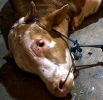 On October 23, 2014, Jill Hall, MP, Federal Member for Shortland, and Kelvin Thomson MP, Federal Member for Wills, voiced their outrage at the sickening cruelty to Australian animals in Gaza, Jordan and Kuwait could have been avoided if the Agriculture Department had acted on the massive catalogue of evidence they've been presented with over the past year.
On October 23, 2014, Jill Hall, MP, Federal Member for Shortland, and Kelvin Thomson MP, Federal Member for Wills, voiced their outrage at the sickening cruelty to Australian animals in Gaza, Jordan and Kuwait could have been avoided if the Agriculture Department had acted on the massive catalogue of evidence they've been presented with over the past year.
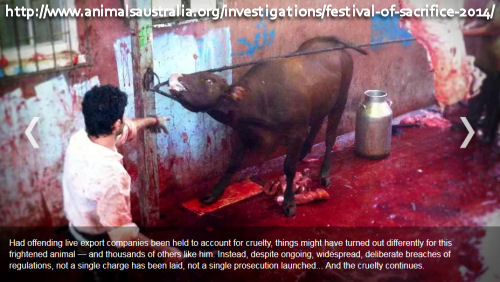 Their joint media release pointed out that export company Livestock Shipping Services (LSS) is yet again implicated in this cruelty. LSS is actually written on eartags of Australian bulls in Gaza. Australian bulls in Gaza are being stabbed to death while fully conscious. LSS is the same company responsible for regulatory breaches in Gaza last year, and implicated in regulatory breaches in Jordan.
Their joint media release pointed out that export company Livestock Shipping Services (LSS) is yet again implicated in this cruelty. LSS is actually written on eartags of Australian bulls in Gaza. Australian bulls in Gaza are being stabbed to death while fully conscious. LSS is the same company responsible for regulatory breaches in Gaza last year, and implicated in regulatory breaches in Jordan.
It is a disgrace that the Department can "investigate" these breaches indefinitely and take no action. It makes a laughing stock of claims by the government and the industry that the ESCAS system is working. The ESCAS system is supposed to make exporters accountable for the fate of the animals. It is doing nothing of the kind. The government is overseeing a regulatory system which is failing in its core mission to protect Australian animals from brutal treatment.
The Agriculture Department Secretary should not give a permit to the LSS ship Maysora, currently docked in Adelaide, to take cattle and sheep to the Middle East. The Secretary could not possibly be satisfied that this exporter has an appropriate compliance record, or that no animals will be subjected to animal cruelty.
Meat and Livestock Australia should be required to report breaches immediately to the Department rather than tip off the exporters.
The export companies responsible for these outrages should have their licences to operate suspended while they are under investigation, and breaches of the ESCAS should result in prosecution. Until real penalties are handed out nothing is going to change.
The Agriculture Minister said last year 'you don't shut the road if someone speeds'. Indeed, but you do take the licence off repeat offenders.
 It’s that carol time of year, they’re playing in my head
It’s that carol time of year, they’re playing in my head
I hear their joyful melodies from daybreak until bed,
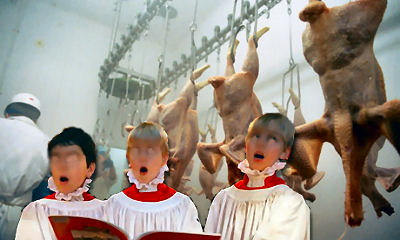 Singing “joy to the world” and “oh Holy night”
Singing “joy to the world” and “oh Holy night”
We hear them in the evening and again when it’s light,
How can we honestly and truly sing “the night is divine” ,
And cattle are lowing, the baby’s born, all’s fine ,
When in our cruel world the suffering is as much at Christmas time,
As any other time of year- with accidents and crime?
And for a song all through the year, people kill each other
One does it to his enemy, another to his brother,
The sadness of each dying soul brings worry and despair
And grief and all the hollowness of losses hard to bear
We pretend the peace and comfort some experience each day,
Is normal and ubiquitous and all the world’s at play,
But not far from where we live, others’ innocence is melted
A dog tied up for days on end, without food or drink or shelter
Cries out for help but no one comes, a casualty of the system.
Forgotten by her owner, the trusted one.. her world,
Abandoned to live out her fate and at last die of starvation.
A band of happy kangaroos in country quite near here,
Are shot en masse, their world destroyed, to leave the land for profiteers.
Unwitting cattle in the north are bred to be exported,
They grow up strong and fat til ready to be sorted.
Obedient, and trusting they line up to board the ships,
Without the need of prodding, manhandling or whips,
Their last few days on board the ship of misery and torture
Finish not in green and rolling fields, gentle weather and good fortune
But in blazing heat or blistering sands
Of far away and foreign lands
Greeted not with care or kindness but brutal actions and dislike,
For crimes they’ve not committed not in memory or in life ,
Of course we shouldn’t send them and our government's to blame
Their hands are stained all red with blood. Most of them are the same.
So Happy Christmas everyone, I hope your table’s loaded,
That brothers talk and mothers speak in phrases carefully worded,
And that carols play for you that day all spiritual and sublime,
To make this festive holiday a holy wondrous time
And you hear the finer voice of yours, your mind can carefully capture
Then you will see the purpose clear, a duty. ‘Twill enrapture!
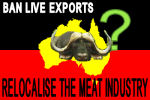 "Australian Governments (Federal, Territory and State), journalists and cattlemen's associations are attempting to cloud facts about Australia's live export trade, known for at least 18 years: Indonesian halal is intended to inflict pain, employing a slow sawing motion to cut throats, rather than the less-than-a-second two-motion movement used by Australian professionals. Moreover, halal knives are invariably blunt. Even if animal rights were legislated in Indonesia, the Indonesian Government is simply too corrupt to maintain regulatory controls." (Tony Ryan)
"Australian Governments (Federal, Territory and State), journalists and cattlemen's associations are attempting to cloud facts about Australia's live export trade, known for at least 18 years: Indonesian halal is intended to inflict pain, employing a slow sawing motion to cut throats, rather than the less-than-a-second two-motion movement used by Australian professionals. Moreover, halal knives are invariably blunt. Even if animal rights were legislated in Indonesia, the Indonesian Government is simply too corrupt to maintain regulatory controls." (Tony Ryan)
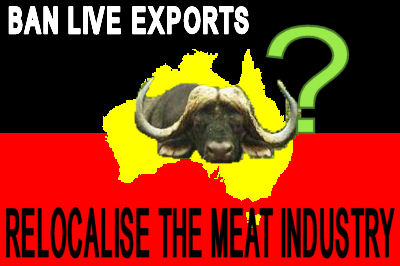
Article by Tony Ryan
Government, journalists, cattlemen's associations, and various politicians, are attempting to cloud the issues about Australia's live export trade.
Here are some facts:
Julia Gillard will say whatever her powerful lobbyists tell her to say, and we cannot rely on her assurances that live export will only proceed on the basis of animal welfare guarantees. It must be stopped now, forever.
There is also the issue of jobs, and regional and rural industrial recovery. Australians need every job we can get, and the elimination of the live export industry will create the biggest explosion in rural and urban jobs in Australia's history.
There is no sound argument to support live export, and ten good reasons (above) why it should be terminated.
We must e-mail to, write to, harangue, and nag our state and federal politicians to end live export. They need to understand that this issue has been embraced by almost the entire nation, and that politicians who do not vote to end live export, will see their names entered on the electoral black list prior to the next elections.
Finally, well done Lyn White of Animals Australia, for her courage in collecting and presenting the evidence of this crime to Four Corners.
This document has been produced by the Ryan Institute of Evidential Demographics (RIED)
PO Box 1786. Sunshine Plaza Qld
4558(07) 54754009
tonyryan43 [ AT ] gmail.com
And also by the: Tariff Restoration Bloc (www.oziz4oziz.com/)
Note: Since 2001, RIED has provided free statistics on unemployment, homelessness; and electoral consensus on current national issues.
Note: The principal of RIED, Tony Ryan, commenced his working life in the cattle industry in 1961 and began studying Top End rural industries after moving to the NT in 1971. He later conducted related socio-economic research for the Commonwealth and NT governments, between 1974 and 1983, and in 1982 wrote about the decline of the cattle industry and recommended replacement by buffalo. He is semi-fluent in several Aboriginal languages, and also worked in NT Aboriginal community development. He is currently developing a demographic and market research service for Australian Business, and the concomitant establishment of an Internet news service, coupled with e-library on the globalisation of Australia ... with particular reference to how this nation can regain control of its economy.
© Copyright 2011: Tony Ryan; RYAN INSTITUTE OF EVIDENTIAL DEMOGRAPHICS
See also: Bring Back the Music - the demise of Oz bands of 22 Oct 08 also by Tony Ryan
Thumbnail Illustration of Princess Alia with Shamekh al shaqab from original at
http://www.straightegyptians.com/international/mideastchamp05/0005x.jpg
"Each year in the Middle East Kingdom of Jordan imports more than a million live cattle a year and sheep from Australia. Animal activists have been campaigning against the practice, arguing that the sheep are ill treated both during the arduous journey and once they arrive. One Australian activist has managed to enlist the support of Princess Alia of Jordan in her quest for animal welfare." 7.30 Report | Wed, 15 Apr 2009 19:39:00 +1000 | Duration 7m 13s ABC video report.
It seems ironic and perhaps a sign of what is to come, that, just as Jordan is cleaning up its act, Australia seems to be going backwards with the ACT's poorly justified attempts to institute frequent mass-slaughter of kangaroos in areas coveted by developers and attempts to expand the roo-meat industry.

(The illustration is of Pam Ahern's well-treated sheep at Edgar's Mission, Kilsythe Australia, where animals are saved from apalling circumstances.)
Animals Australia has given permission for me to publish on Webdiary its record of major incidents in the trade. It is an appalling record. In reading the facts relating to these incidents one can get some idea of the enormous level of suffering of large numbers of animals in this trade. - Jenny Hume
As a follow up to my last piece on the live animal exports issue Animals Australia has given permission for me to publish on Webdiary its record of major incidents in the trade. It is an appalling record. This record does not even include the routine losses that occur on voyages. Only when a large number of animals are lost in specific incidents or losses exceed 3% is a report required by the Australian Marine Safety Authority (AMSA). Total losses per annum are however tabled in Parliament every six months so cumulative totals are known.
For instance it does not include the approximately 1000 sheep that died on the Al Kuwait, a routine shipment with routine losses that was the subject of the successful court case in WA against the company shipping those sheep. The basis of the that case was that to ship animals live while knowing the risks involved, the company had knowingly transported animals in a manner that would cause them unnecessary suffering, in contravention to the animal welfare laws of that State. The case was proven.
Hence a tally of the losses in the incidents here for the years 2000-6 will not even come part way to adding up to the documented losses in that period alone of close to 350 000 animals, nor does it include the 30 608 that died in 2007. It touches on major onshore incidents but does not reflect the issue of cruelty to surviving animals in handling and slaughtering procedures in importing countries. While the majority of animals go to Middle Eastern countries, large numbers are also exported to Indonesia, the Philippines, Japan and South Korea.
In reading the facts relating to these incidents one can get some idea of the enormous level of suffering of large numbers of animals in this trade. The list below does not include more recent incidents and will be updated at a later date.
1996: 1592 cattle drowned when the Guernsey Express sank after taking water on its way to Osaka. Japan. No report has yet been provided.
1998: The 'Anomis' arrived in Malaysia from Geraldtown WA in January with over 2,400 goats and cattle but could not unload due to a financial dispute between the exporter, shipper and importer. The ship was held up for over two weeks and some 283 goats and 154 cattle are reported to have died. No report has yet been provided.
1998: The MV 'Charolais Express' hit heavy weather on route from Bunbury (WA) to Jordan in July. 346 cattle, of the 1,200 loaded, are reported to have died due to inadequate ventilation. Fifty cattle then died in a Jordanian port, and a further 174 were injured or ill and were subsequently rejected by Jordan, then by Yemen, and ultimately disposed of at sea.
1999: The 'Temburong', 829 cattle suffocate when power loss causes ventilation failure on the ship during the voyage from Darwin to Irian Jaya in January. The formal report recommended improved management of back-up power sources (www.amsa.gov.au).
1999: Some 800 cattle were loaded onto the 'Kalymnian Express' in December 1999 in Western Australia bound for Indonesia. Over 300 cattle died of injuries, or were destroyed later due to their injuries, when the ship met a cyclone off the north west coast of Western Australia. (report at www.amsa.gov.au)
2000: Two shipments of cattle to Korea were rejected at their destination when local farmers believed the trade would threaten their local 'Hanwoo' cattle industry. Six cattle were beaten to death while the remainder had to be held in quarantine and on board ship until the Korean Government were able to move them to slaughter.
2002: 99 cattle died on the NV Norvantes en route to Jakarta in February when the ship hit bad weather. The vessel left Darwin carrying 1,169 cattle. (report at www.amsa.gov.au)
2002: The Israeli Government reported that in July, cattle and sheep on the M.V. Maysora arrived from Australia and experienced heat, unloading and transport delays, and were delayed at border-crossings. Some 200 cattle died, most after arrival. Israel temporarily halted all imports of Australian cattle for several weeks until the delays and transport problems were said to be 'resolved'.
2002: The MV Becrux, on its maiden voyage and boasting the ability to provide the highest standard of animal welfare and comfort, carried 1,995 cattle and 60,000 sheep from Portland Victoria to Saudi Arabia in July. 880 cattle and 1,400 sheep died after the vessel met extreme temperatures (45 degrees) and humidity in the Arabian Gulf. The remaining animals were rejected by Saudi officials and had to remain on board until another buyer was found to accept them (in the U.A.E).
2004: The MV Maysora delayed in Aqaba port in Jordan with 3,300 cattle languishing on board for almost a week whilst importers argued about feedlot space.
2005: Australian cattle offloaded in Israel from the Bader III were held up for some 24 hours in heat at the border crossing with The Palestinian Authority. Local animal advocates documented the distressed animals which had had no food and water during their truck journey and delay at the crossing.
2006: At least 247 cattle died aboard the MV Maysora on a journey from Portland (Victoria) and Fremantle (WA) to Israel in October/November. At least a further 200 Australian cattle (and some reports suggest up to 500) died in quarantine feedlots in Israel after arrival, and were buried in pits. Formal AQIS and AMSA investigations were triggered as the on-board cattle death rate was over 3%. The cattle died due to septicaemia (from infected injuries), heat stress and pneumonia (respiratory disease). Only 30 - 40 of the cattle were euthanased.
2007: 3,500 Australian cattle were caught up in an Israeli agriculture and veterinary workers strike in January. The cattle were delayed, and then unloaded into quarantine feedlots, but without standard veterinary health checks. Half were destined for Israeli slaughterhouses, and the rest were to be transported to the Palestinian Territories.
2007: A ship with 1,695 cattle on board traveling from Fremantle (WA) to Jakarta (operated by Halleen Australasian Livestock Traders Pty Ltd) was battered by a cyclone. 68 cattle died (4.01%) during the 8-day voyage.
1980: The total cargo (40,605 sheep) perish in a fire aboard the Farid Fares.
Disease outbreak causes the death of 2,713 sheep on the Kahleej Express.
1981: 635 sheep die in the transfer from the Kahleej Express to the A1 Shuuwaikh.
8,764 sheep perished onboard The Persia from ventilation breakdown.
1983: 15,000 sheep die from exposure in Portland feedlots while waiting loading.
1984: Ventilation breakdown in the Mukairish Althaleth causes the death of 70 sheep each day.
1985: 15,000 sheep die of heat exhaustion on board the Fernanda F.
1989-90: Many Australian shipments rejected due to claims of scabby mouth and other diseases, by Saudi Arabia . Death rates on board soared to an average of 6% as sheep waited on board ships languishing outside ports or en route to alternative ports.
1990: One rejected ship, the Mawashi AI Gasseem was forced to stay on the water for 16 weeks before a country would accept its remaining sheep.
1990: The "state of the art" Cormo Express left New Zealand in May 1990 and almost 10,000 sheep died en route to the Middle East due to inadequate ventilation causing heat stroke, pneumonia, other diseases and failure to eat.
1991: At the end of the Gulf War, Australian sheep arrived in war-devastated Kuwait and some 30,000 sheep died from heat stroke and dehydration due to poor infrastructure and feedlot facilities.
1991: Published studies show death rates in Middle East feedlots to be, on average, 3 per cent over the 3-week holding period.
1992: Published figures show increased on-board death rates, rising to almost 3 per cent, the rise being attributed mainly due a large number of ships unloading at more than one Middle East port attributed mainly due a large number of ships unloading at more than one Middle East port.
1996:67,488 sheep died when fire broke out on board the Uniceb; 8 days elapsed before any rescue attempt was made.
2002: The MV Becrux, on its maiden voyage boasting the ability to provide the highest standard of animal welfare, carried 60,000 sheep and 1,995 cattle from Portland Victoria to Saudi Arabia . 1,400 sheep died along with 880 cattle after the vessel met high temperatures (45 degrees) and humidity in the Arabian Gulf .
2002: In July and August 4 shipments of sheep recorded high death rates during export to the Middle East , and a total of 15,156 sheep died during the voyage and discharge phase. Cormo Express: 1064 sheep died, Corriedale Express: 6119 sheep died, Al Shuwaikh: 5,800 sheep died, and Al Messilah: 2173 sheep died. AMSA/AFFA and AQIS conducting 4 separate inquiries. At least one ship, the Al Shuwaikh, was allowed to load more sheep in September and leave for the ME before any reports are completed, albeit with an AQIS vet on board. A further 2,304 (3%) sheep died.
2003: Saudi Arabia rejects the MV Cormo Express (allegedly on disease grounds) in August, with 57,000 sheep on board. No other country would take the sheep – and it was late October before Eritrea agreed to offload them. 10%, around 6,000 sheep, died during the three month-long voyage. Australia suspended all live export too Saudi Arabia (resumed in mid 2005)
2005: The MV Maysora was delayed fully laden with 80,000 sheep in Fremantle harbour when engine problems occurred. No animal welfare authorities were alerted.
2006: In February 2006 the MV Al Messilah loaded 786 cattle in Portland (Vic.), and then loaded 71,309 sheep in Devonport (Tas.) for the trip to several Middle East countries including Kuwait. Thousands of sheep were rejected at the feedlot prior to loading due to 'pink eye' infections and other problems. Fully laden the staff resources were not sufficient to treat all the cattle (6 died) and sheep that became ill - 1683 (2.36%) of the sheep died - due to heat stress and failure to eat, exacerbated by pink eye and other problems.
The MV Maysora arrived in Eilat Israel in early November and a consignment of sheep was rejected - said to be due to a suspected scabie mouth outbreak in sheep from an earlier voyage on the MV Bader III. Some of the sheep were offloaded in nearby Jordan and others (approximately 40,000) were unexpectedly taken to Egypt and killed during the Eid Al Adha festival. 862 sheep died on the month long voyage (under the reportable death rate).
The continuing loss of tens of thousands of animals every year and the incidents above clearly demonstrate one of the conclusions reached in two major inquiries into the trade - that the trade by its very nature had animal welfare implications. As demonstrated by the the trade can never be made humane.
This article also published on WebDiary with the permission of Animals Australia.
See also: Why Australia's trade in live animal exports is world's WORST practice of 18 Jun 08, Live Exports – Another 36,408 animals dead on ships yet the trade goes on of 28 Aug 08 by Jenny Hume on WebDiary, www.liveexportshame.com www.liveexport-indefensible.com, www.animalsaustralia.org.
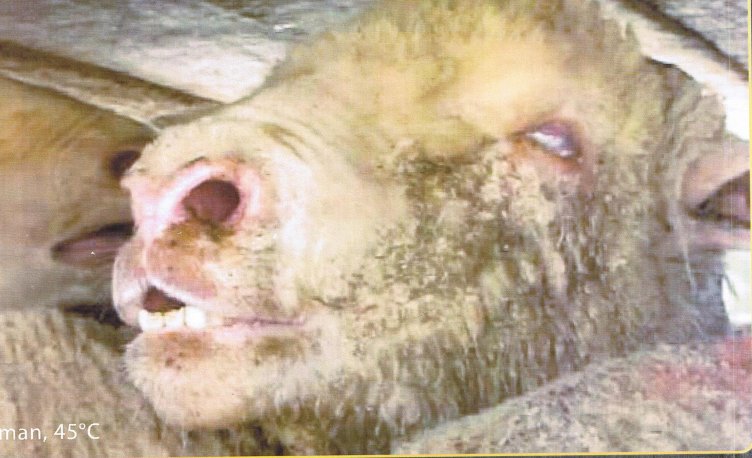
Australia claims to have the best regulated live animal export trade in the world. But regulation is one thing, and enforcement is entirely another. The trade is supposedly regulated by the Australian Standards for the Export of Livestock, and all available evidence indicates that while these industry-developed standards exist, they are largely unenforceable, unenforced, and barely provide these animals with any protection while they are still in Australia, much less when they leave Australian waters.
The Standards are monitored by AQIS, the Australian Quarantine Inspection Service, and this is how well it is done.
Animals Angels frequently attends loadings in Fremantle. They state that there are routinely no government inspectors present at the wharf to deal with transport mismanagement such as overloading, ill and injured animals arriving for export, and cruelty such as beating and throwing the animals and the overuse and inappropriate use of electric prod devices.
These are some examples cited by Animals Angels
.
On Sunday 01.06.2008, they had to call an AQIS inspector. Likewise on 3 Apr 2008, 25 Mar 2008, and 21 Dec 2007, when they actually have to call AQIS to attend. AQIS arrives, but does no inspections.
A review of the AQIS mortality reports that Animals Australia was able to obtain under Freedom of Information provisions indicates that in almost all cases, the animals are not given the mandated periods in "registered premises" (feedlots) to accustom them to pelletized fodder. In November 2006 on the "Maysora", more than 450 cattle died either on the ship or on arrival in Tzofar; these cattle were southern bred cattle loaded in contravention of the ASEL. Heat exhaustion, pneumonia, septicaemia were the causes of death reported. On a voyage from Tasmania in 2006 on the aging "Al Messilah", a former car transporter, ill and injured sheep were loaded, the animals only had a matter of hours in the feedlot and there was not enough feed on the ship for the journey. 1,632 died on the ship, from starvation, heat exhaustion and trauma.
The industry then would have us believe that it can influence the way animals are treated in importing countries. Please visit the link below to see how successful they are.
www.youtube.com/watch?v=X1_BOAF7qvk
Further information attesting to this filmed by Animals Australia is at its
Live Export Indefensible website (www.liveexport-indefensible.com)
Now the Australian government (Rudd, the man who "cannot abide cruelty") is resuming the trade in cattle to Egypt. Most of the countries in the Middle East, including Egypt, to which Australia exports animals are signatories to (minimal) OIE (International Organization for Animal Health) animal welfare standards. You be the judge of their compliance.
No Memorandum of Understanding Australia has signed with any of these countries is legally enforceable, none has been tested, and they only provide for the animals to be offloaded from the ships in the event of a "dispute". They were developed to avert another public relations disaster like the 2003 "Cormo Express" tragedy, when 55,000 sheep were rejected by Saudi Arabia, and drifted around the Gulf for more than three months before Eritrea was persuaded to accept them. Representatives from Compassion in World Farming in Eritrea at the time claimed that only about 40,000 sheep were alive to be unloaded in Eritrea and left to a largely unkown fate. The "Cormo Express" was re-named the "Merino Express" very soon afterwards.
While the industry can claim that mortality rates on board the ships have improved, over 2 million animals have died on these voyages in recent years. The industry also claims that it can "improve" handling and slaughter practices in these countries where animal protection laws are non-existent. It is using your tax dollars in its token efforts to do so, and these wholly unsuccessful efforts are only in response to the massive public exposure on reputable documentary programs of the appalling brutality these animals face. Consider the human rights records of these countries. What hope do animals have? The images that remain in my mind are of cattle having their leg tendons slashed and eyes stabbed before being hacked to death, and the bull, hit so hard over the head with a metal bar that he was on his knees trembling - before the film was cut off. Sheep are thrown by ears and legs, and thrown into car boots or onto roofracks with their legs hobbled. They are dragged to slaughter by often broken legs, and their throats hacked at until they finally bleed to death, fully conscious.
This cruelty is outlawed in Australia, and it is unconscionable for the Australian government to allow animals to be treated like this half way across the world. Please remember, turning away from these hapless animals - saying "I can't look at this" - is abandoning these millions of animals, and telling the government that you find this disgraceful trade - and the fact that you are helping to fund it - acceptable.
See also: Live exports - a litany of disasters of 1 Sep 08 by Jenny Hume on WebDiary.
Live Export Shame at www.liveexportshame.com
Live exports - a litany of disasters of 1 Sep 08 by Jenny Hume on WebDiary
Recent comments